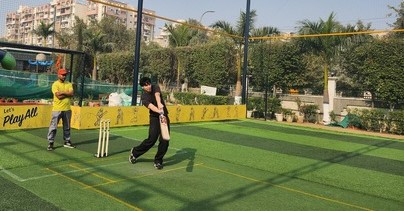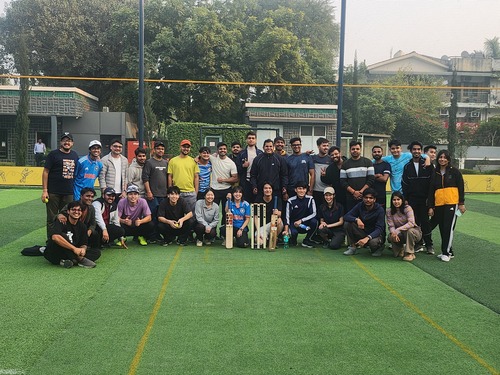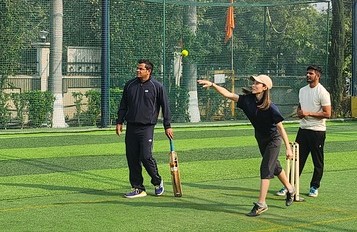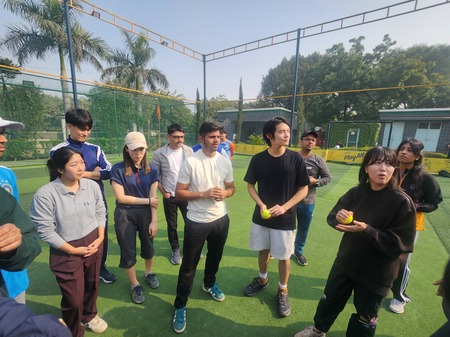Japanese youth try their hands at cricket bat and ball; hit fours & sixes, take wickets
Holding cricket bat for the first time, the Japanese youth surprise all with their powerful shots, and pick up the sport fast.
NEW DELHI: On a sunny Sunday, December 22, 2024, the cricket ground in Dwarka came alive with an unusual and thrilling event. The Indians vs. Japanese Speakers Cricket Tournament, organized by 21-year-old Japanese intern Kento Osonou, was a celebration of sports, culture, and camaraderie. For Kento, who had arrived in India only six months earlier, this marked an extraordinary chapter in his life. Having discovered cricket in India, he decided to create a unique platform called Japanese Community Kizuna, uniting Japanese nationals and Japanese-speaking Indians for an exciting day of cricket.
 Kento’s first encounter with cricket was during a live match he stumbled upon after arriving in India. Fascinated by the sport’s vibrant energy, he resolved to learn more about it and share the experience with his fellow Japanese nationals.
Kento’s first encounter with cricket was during a live match he stumbled upon after arriving in India. Fascinated by the sport’s vibrant energy, he resolved to learn more about it and share the experience with his fellow Japanese nationals.
Despite never having played cricket before, Kento held a cricket bat for the very first time during this friendly yet competitive tournament.
Among the Japanese players was Ms. Ginya Nozuka, a spirited young professional who also tried her hand at cricket for the first time. Ginya’s enthusiasm was infectious, and her impressive attempts at both batting and bowling added to the tournament’s charm. Alongside Kento and Ginya were Taiki Mori, Kato Nanako, K R, G M, and T R—three of whom were women—braving the pitch with determination and joy.
 Throughout the event what was heart-touching was the fact that Indian players took all the care to help Japanese friends learn the basic nuances of cricket sport. They looked more than helpful in making the Japanese understand the intricacies of the great sports that is regarded nothing less than a religion in India.
Throughout the event what was heart-touching was the fact that Indian players took all the care to help Japanese friends learn the basic nuances of cricket sport. They looked more than helpful in making the Japanese understand the intricacies of the great sports that is regarded nothing less than a religion in India.
The Indian side too witnessed participation of girl power who exhibited equal courage including Keshavie, Shivani and others. Among the boys, notable presence was made by Shashank, Rohtash, Piyush, Ayush, Shiwam, and others.
The tournament featured four teams: Yuki, Midori, Kaizen, and Sora, comprising a mix of Japanese players and Japanese-speaking Indians. Each match was a short yet electrifying battle. In the first match, Yuki faced Midori in a nail-biting contest. Midori triumphed with a narrow victory, scoring 28 runs, just ahead of Yuki’s 26 runs.
 The second match saw Kaizen take on Sora in a high-energy clash. Kaizen displayed their prowess with a solid win, scoring 75 runs, while Sora fell slightly short with 71 runs.
The second match saw Kaizen take on Sora in a high-energy clash. Kaizen displayed their prowess with a solid win, scoring 75 runs, while Sora fell slightly short with 71 runs.
The third match was between Yuki and Sora, where Sora emerged victorious in another closely fought contest, scoring 37 runs to Yuki’s 35. The final match of the day saw Kaizen and Midori face off. Kaizen showcased their dominance yet again, securing a high-scoring victory of 76 runs against Midori’s 73 runs.
The tournament was more than just about scores. It was a celebration of learning, cultural exchange, and unity. The Japanese players, many of whom were wielding a cricket bat for the first time, surprised everyone with their natural athleticism and quick adaptability. Some even managed to hit boundaries and take crucial wickets, earning cheers from the crowd.
 The standout performer of the day was Sachin, who was declared the Best Player for his exceptional skills and sportsmanship. His guidance to the Japanese participants was invaluable, ensuring everyone felt included and supported.
The standout performer of the day was Sachin, who was declared the Best Player for his exceptional skills and sportsmanship. His guidance to the Japanese participants was invaluable, ensuring everyone felt included and supported.
As the matches concluded and the sun began to set, the players and spectators gathered for a closing ceremony. Kento expressed his gratitude to all participants and supporters, highlighting the event’s success in fostering connections and bridging cultures. He said, “The energy, the smiles, and the spirit of teamwork we saw today were incredible. I never imagined cricket could bring us all together like this.”
For the Japanese participants, the tournament was a delightful introduction to a sport that was previously foreign to them. For the Indian players, it was an opportunity to share their passion for cricket while building friendships that transcended borders. The Indians vs. Japanese Speakers Cricket Tournament left an indelible mark on everyone involved, proving that sports can be a powerful tool for cultural exchange and unity.


